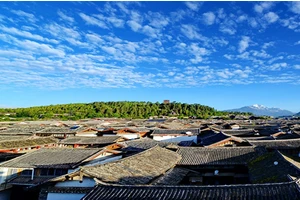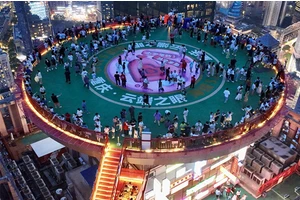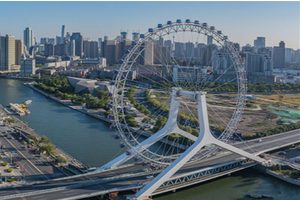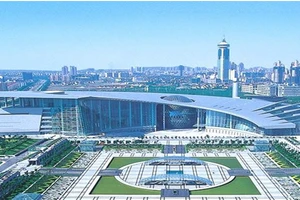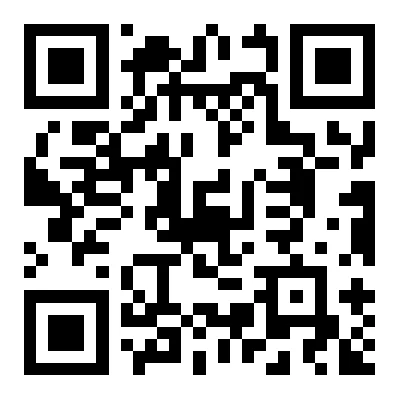Fa yi Rui de travel
leave the country
1. Please bring your passport, visa, air ticket and invitation letter. If you have nothing to declare, please leave Hong Kong through the green channel.
2. When you leave China, please declare your valuables such as cameras, laptops and cameras with detachable lenses to the customs;
3. Please go to the airport for boarding pass, border inspection and security inspection as far as possible three hours in advance.
Second, luggage
1. Check one piece of luggage for free (the weight does not exceed 20-30 kg, and the total length, width and height does not exceed 269 cm). Daily necessities and clothes can be put in the suitcase (scissors, fruit knives and all metal objects should be entrusted);
2. If you need to pack your luggage, please pack it at the packing counter in advance. Please be careful not to pack your documents and valuables.
3. Carry-on baggage (the total length, width and height shall not exceed 115cm). Please put more valuable and fragile items or items that you need to take at any time in the carry-on baggage. For example, self-provided medicines, laptops, video cameras, digital cameras, batteries, etc. Please take your passport, air ticket, cash and other valuables with you.
Third, clothing
1. Spring: (March, April and May) The real arrival of spring is probably at Easter in April. It is warm and cold in spring, so it is necessary to prepare thin sweaters and coats;
2. Summer: (June, July and August) Tourist buses are generally air-conditioned, which is cooler in the morning and evening, so a thin coat is needed;
3. Autumn: (September, October and November) Autumn is a good season in a year, and the temperature is generally around 10 degrees. Please prepare simple warm clothes;
4. Winter: (December, January and February) There is heating equipment in most occasions, but please bring a coat that can keep out the wind and keep warm for getting on and off and places without heating equipment.
Note: It is recommended to bring an umbrella or raincoat in spring and autumn.
Fourth, the time difference
The time difference between Europe and China is six hours in summer and seven hours in winter. When it is best to deal with the time difference, let nature take its course and everything will be subject to local time.
V. Catering
1. Breakfast is mainly Western-style buffet. Western European countries have different eating habits. Breakfast in Britain, France, Switzerland and Italy is very simple and needs attention. Lunch and dinner are mainly Chinese, but I'm afraid it's not as good as the pure taste in China. I hope you can understand.
2. When having breakfast buffet in the hotel, please choose a proper amount. Do not leave too much food on the plate or pack it away, which is prohibited by the hotel.
3. The drinks in the hotel room are very expensive. If you don't drink them, please don't move them, so as to avoid automatic accounting by the hotel computer.
4. Drinking water is usually not prepared in hotels, and cold tap water in most parts of Europe (except Venice) meets the hygienic standard for drinking water (please do not drink hot tap water);
5. If the guests are taboo on certain foods, please inform the tour guide or tour leader so as to make proper arrangements.
VI. Accommodation
1. Hotels in Western Europe are quite different from international hotels in China in terms of hardware facilities. The lobby is not spacious, the elevator is narrow, but it is very clean. It is recommended to bring your own disposable items such as slippers and dental appliances, which are usually not provided by the hotel;
2. Please don't walk out of the room in pajamas; Please don't wear slippers in the hotel lobby or its affiliated restaurants and bars; Loud noise is forbidden in the hotel, so as not to affect the rest of other guests;
3. When you leave the hotel, please inform the tour leader or escort, and bring a business card with the hotel address and telephone number for use when you get lost. It is best to travel together (among them, it is best to know a foreign language) to ensure safety;
4, the hotel telephone is expensive, it is recommended to buy a telephone magnetic card and use a public telephone (all telephone booths in Europe can make direct international calls);
5. The power socket in Europe is cylindrical with a voltage of 220V, which is different from that in China. Please pay attention to the adapter.
6. Some hotels have pay TV service. Please consult the tour guide before staying in the hotel to avoid unnecessary expenses.
VII. Safety
1. Please don't put cash or other valuables in your luggage when you check it in. If your luggage is lost, please fill in the lost or lost baggage form at the airport in time.
2. Please take money, passports, air tickets and other valuables with you, and do not put them in hotel rooms or on transportation;
3. In scenic spots, hotel breakfast rooms, restaurants and other places, pay attention to personal belongings, do not display too much cash and other valuable items in public places, and take good care of air tickets and passports;
4. During your stay abroad, you must participate in collective activities, obey the arrangement of the team leader and local tour guides, and you are not allowed to leave the team without authorization and act according to your own will;
5. Cars in Western Europe travel faster, so please obey the traffic lights when crossing the road;
6, don't leave the hotel alone, especially at night, it is best to have more than 3 people together.
VIII. Transportation
1, prohibit the use of mobile phones, game machines on the plane; According to European law, the use of mobile phones on the plane will be fined and even investigated for criminal responsibility;
2. Please take your seats accordingly on the plane. If you need to adjust your seats, please contact the flight attendant.
3. Smoking is prohibited in the engine room, tourist buses and some restaurants. Please follow the instructions and respect the rights and interests of others. When traveling in Europe, most people take luxury buses. Please throw the waste in the designated dustbin. Do not smoke in the car without the driver's permission. Please put your luggage in the special luggage compartment.
4. According to European law, drivers must not drive for more than 9 hours/day and must have at least 12 hours of rest every day; Drivers must rest for 20 minutes every two hours;
5. European laws have strict restrictions on working hours. If you need extra services, you need to get the consent of the local tour guide driver and pay some extra fees. Please respect and cooperate with the work of the tour guide driver so that the trip can go smoothly.
IX. Health and Drugs
You may feel uncomfortable when you go out, so you should prepare some usual medicines for emergencies. If you need to take certain drugs for a long time, such as high blood pressure, heart disease, stomach trouble or diabetes, you must bring enough drugs and doctors' prescriptions just in case.
X. Shopping
1. There is no habit of bargaining when shopping in Europe. When shopping, don't touch the goods at will. If you want to take the goods to your hand, you should say hello to the clerk first. If you just want to look and have no intention to buy, you should just say just looking.
2. When you shop in a store that has joined the "European Duty Free Shopping System", please ask the salesperson for a duty-free document so that you can stamp your exit stamp and get cash when you leave the country for customs clearance.
XI. Tipping
1. The tourist services in European countries mostly adopt the tipping system, and the income of waiters is mainly the tips of customers; Drivers and tour guides also need to tip, usually the group unit has already paid a tip before the group leaves;
2. If drivers and tour guides need to work overtime for self-funded programs in the evening, they should pay overtime wages to the driver leader reasonably;
3. Luggage handling fees are not included in the tour fare. If you need to arrange a bellman, please pay the tip yourself.
You need materials for a visa to travel with a group in Germany, France and Italy.
1. Passport: 2 2-inch photos. Passport must provide copies of all visa records.
2. Visa Application Form: Download it from the website of the other consulate.
3. Round-trip air ticket booking form: As long as the ticket office or air ticket agent can buy international air tickets, it can be issued.
4. One visa insurance: the insurance amount is 30,000 euros or more, which needs to cover the whole journey. You can find an insurance company or buy it online.
5. Certificate of going abroad: a certificate issued by the work unit, including the applicant's name, position, salary and time spent traveling abroad. And indicate the name, address and telephone number of the person in charge of the work unit, affix the official seal and issue the name, position and signature of the person in charge of the certificate, with English translation.
6. Proof of residence and reception in Schengen countries: Some countries can accept the website reservation certificate, while some countries only accept the hotel fax certificate, so you can check it on the website first.
7. Household registration book: original and photocopy, and all contents need to be translated.
8. Personal financial guarantee: salary, unfrozen deposit certificate, or real estate license, or car purchase, etc. Original and translation are required.
9. ID card: original and photocopy are required.
10. All the above materials need one original and one copy. A4 paper is required and submitted in the above order.
Extended data:
There are several ways to apply for a Schengen visa:
1, only to a member state, should apply for the country's visa, namely "country visa". A "country visa" can only be valid in and out of the issuing country, and it is not allowed to enter the issuing country from other Schengen countries, otherwise a "Schengen visa" should be applied for. The number of days of stay on the visa is only valid within the validity period of the visa;
2, transit a member state or several member states to another member state, should apply for another member state (country of entry) visa;
3. When going to several member countries, you should apply for the visa of the member country that mainly visits or stays for the longest time. If you can't determine the main visiting country, you should apply for the visa of the first country you visit.
4. Those who go to overseas territories or trust places of France, the Netherlands, Portugal and other countries, as well as the Faroe Islands and Greenland in Denmark, should still apply for visas to their countries; If you want to go to Faroe Islands and Greenland, you must also apply for a consent when applying for a Danish Schengen visa or a Danish country visa. Please note on the visa.
5. When visiting or visiting several Schengen countries, you need to fill in the itinerary, that is, the details of the countries and routes visited and the schedule of stay, and provide an invitation letter to visit the countries; The visa application form of which country is applied for, and the receiving country may request additional materials when necessary.
Schengen countries sometimes issue their own visas, which can only go to this country and cannot go to other Schengen countries; The number of days of stay on the visa is only valid within the validity period of the visa;
6. Long-term visas exceeding 90 days are still examined and issued by the host country. Those who have already held a long-term residence permit of a member country can freely enter any member country without applying for a visa with valid international travel documents, and their stay period shall not exceed 3 months;
7. Only one entry valid "Schengen visa" can be applied, and you can only travel within the Schengen countries within the validity period, and you can't transfer to non-Schengen countries and then return to Schengen countries;
8. The Schengen Agreement does not specify the visa exemption agreement for permanent diplomats, public servants and short-term official and diplomatic passports, which shall be handled by each country.
Source of reference: Baidu Encyclopedia-Schengen Visa


